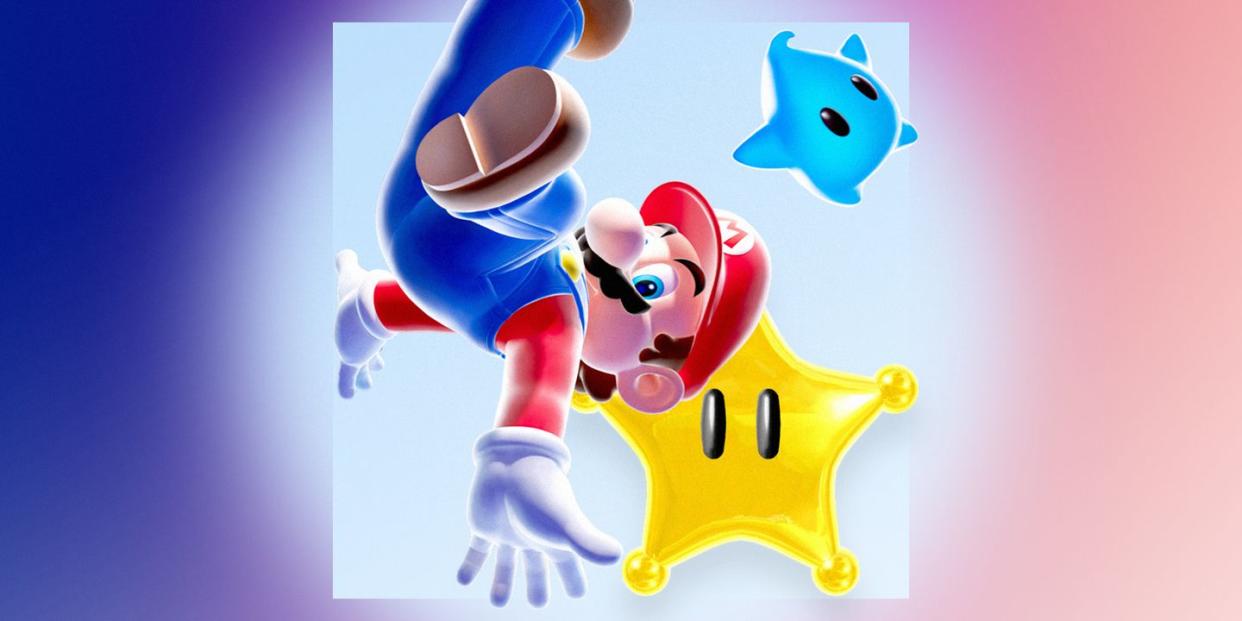15 Years Ago, 'Super Mario Galaxy' Made It Cool to Be a Gamer

It was 2006, and I was discombobulated. My older brothers had both left for college, and I was, for the first time in my life, an only child. Being the youngest by a long shot, video games like Mario 64 had long been a reliable source of camaraderie. But I was a freshman in high school now. Kids didn’t play Mario games. They played Halo. They played Grand Theft Auto: Vice City. Or, as I’d recently discovered, some kids didn’t play any video games at all. “Why do you waste your time?” I remember one of the seniors from Bowling Club scold me. “You could be hooking up with girls!”
The fact that there hadn’t been a great Mario game in about ten years certainly didn’t help to mitigate my looming identity crisis about being a “gamer.” Mario 64 had reset the clock on all things Nintendo in 1996, but then Super Mario Sunshine, which debuted right before I got to middle school, delivered a disconnected—albeit ambitiously weird—water-soaked detour. Like Sunshine, I was confused about who I was and what I was supposed to be, and because they made us shower after gym class every damn day, I was always a little damp, too.
Super Mario Galaxy premiered a year after the Wii filled up—and promptly emptied out—shelves in 2006. The game, which finally abandoned the series’ obsession with gravity and sent Mario soaring into space, is the sort of marvel of engineering that you hope for in every video game that you play. It’s lush, with every inch of the screen covered in bright, gleaming textures. The levels, each of them set to staggering (and real!) orchestral music, seem to dance in orbit around themselves, as Mario leaps from planet to planet, with stars and comets exploding all around him like fireworks. The game was just released on the Switch as part of a Super Mario 35th anniversary collection, and it is a joy to revisit, just as it was in my confusing, early days of high school, when I needed a video game to help remind me why I played video games in the first place.

After the Wii premiered, with its party-centric titles and pain-free motion controls, it seemed like, out of nowhere, everyone was playing Nintendo games again. The console demolished sales records and remains, to this day, among the best-selling pieces of video game hardware in history. Everyone had one; you’d walk past classrooms after school and see kids duking it out on Wii Sports Boxing on the slide project screen. Suddenly, it was no longer embarrassing to exchange friend codes and brag about the characters you’d unlocked in Smash Bros. around the lunch table. So you can imagine how joyful it was for me when Mario Galaxy was announced. Not only had I been allowed to bring a part of my youth into high school, but my favorite series of all time was set to come back in a big way—so big, in fact, it was intergalactic. And I found that there were a lot more kids excited for it, too. Like me, their love of Nintendo no longer needed to be hidden. By the time the game premiered, many of them had become my closest friends.
What I recall most about Mario Galaxy is that feeling of elation. Even as I play it today on Super Mario 3D All-Stars, which tactfully switches up the motion controls so it even works when your Joy Cons are docked, I am in awe of its commanding power. All the other Mario games have been glued to the ground, trapped inside castles and disconnected worlds full of obstacles that force you to tread slowly and paw Mario ahead one step at a time. In Galaxy, the training wheels are off. The levels stretch on infinitely, blanketed by the black void of space. Mario skips, flies, or even ice skates upside-down, quite literally flipping many of the essential mechanics of the franchise on their heads.
I’m actually surprised that Galaxy—which, sure, received a bunch of 10/10 scores in its time—doesn’t quite have the cultural cache of a game like Mario 64. 64 added a dimension to the series, but Galaxy finally freed Nintendo from so many of the predictable trappings of the platformers that it had helped create, finally proving that Super Mario could remain relevant in the modern day. It’s the game that established Mario as an unstoppable force in the industry, and the reason I still leap at the chance to play Nintendo games today. Because, man, when Nintendo shoots for the stars, it does not miss.
You Might Also Like

